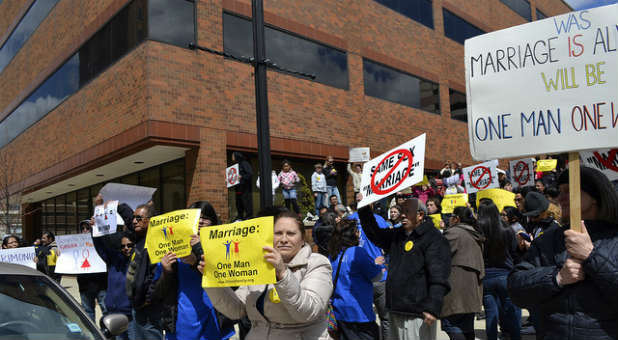On April 28, the Supreme Court will hear oral arguments in Obergefell v. Hodges and three other appeals in key marriage cases.
Last year, the U.S. Court of Appeals for the Sixth Circuit upheld the constitutionality of state marriage amendments in Tennessee, Kentucky, Ohio and Michigan defining marriage as the union of one man and one woman.
The Supreme Court granted review and will soon consider the constitutionality of upholding marriage as solely a male-female union.
A primary argument made by those wishing to redefine marriage is that the Due Process Clause of the U.S. Constitution (14th Amendment) requires marriage to be made available to same-sex couples. In this instance, the district court in Ohio agreed — holding that the “fundamental right” to marry had been unconstitutionally denied same-sex couples.
A number of federal court opinions issued since the Supreme Court’s 2013 decision in Windsor v. United States, striking down Section 3 of the Defense of Marriage Act, have accepted this line of reasoning.
However, the Supreme Court has stated that it is reluctant to increase the catalogue of such rights and interests given the clause’s open-ended language. That said, there is a fundamental right to marry that the Supreme Court has recognized on numerous occasions. Clearly, it covers the right of a man and woman to marry. But does it entail more than that?
When considering whether an asserted right is “fundamental,” we are to rely on the test that the court set out in Washington v. Glucksberg (1997). First, the court requires the presentation of a “‘careful description’ of the asserted fundamental right or liberty interest.” The claimed right must be described precisely. Second, such rights must be “deeply rooted in this Nation’s history and tradition.”
Furthermore, the right must be “so rooted in the traditions and conscience of our people as to be ranked as fundamental.” The sought-after right must be “implicit in the concept of ordered liberty” so that “neither liberty nor justice would exist if (it was) sacrificed.”
In the current cases, a broad definition like “being able to marry the person of one’s choice” does not describe what the plaintiffs seek. They are permitted to marry at present, but they must marry a person of the opposite sex.
That is how the right to marry has always been understood, but that is not the type of marriage the challengers want. Rather, they seek the legitimation of a new right—a right to a governmentally recognized conjugal arrangement for persons of the same sex.
The next step in the Glucksberg analysis requires an inquiry into whether this new, purported right to same-sex marriage would be deeply rooted in this nation’s history and traditions, and would, therefore, be a fundamental right. Same-sex marriage is a novel concept.
No state contemplated redefining marriage until Hawaii approached the issue in the early 1990s, and it was not until May 2004 in Massachusetts that the first same-sex marriages were recognized.
Clearly, any right to enter into a same-sex marriage could not be deeply rooted in this country’s history and traditions. Consequently, there is no fundamental right to same-sex marriage.
Reaching this conclusion does not preclude other constitutional challenges, nor does it prevent legislatures from enacting statutes that allow couples of the same sex to marry. Rather, it merely prevents the Due Process Clause from being used to overturn the marriage laws of dozens of states.
If the Supreme Court were to engage in such judicial activism, it would not be well received by American voters. A recent poll of 800 registered voters conducted by Wilson Perkins Allen Opinion Research for the Family Research Council makes this clear. By 61 percent to 32 percent, the voters preferred that states and their citizens define marriage—not the Supreme Court.
The American people want to be free to decide how marriage is defined in America, and they do not wish to be ruled by a judicial oligarchy. The Supreme Court should remember this as it weighs the arguments in these four same-sex marriage cases.
If it hands down another Dred Scott or Roe v. Wade, the court’s own legitimacy will be severely damaged.
Chris Gacek is the Senior Fellow, Regulatory Affairs at Family Research Council.
See an error in this article?
To contact us or to submit an article




















